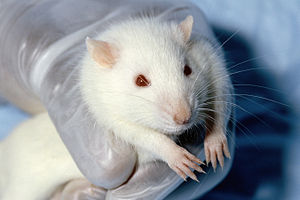Wistar rats: Difference between revisions
No edit summary |
No edit summary |
||
| (2 intermediate revisions by the same user not shown) | |||
| Line 1: | Line 1: | ||
[[File:Wistar rat.jpg|frameless|right]] | |||
The Wistar rat is an outbred albino rat. This breed was developed at the [[wikipedia:Wistar_Institute|Wistar Institute]] in 1906 for use in biological and medical research, and is notably the first rat developed to serve as a [[wikipedia:Model_organism|model organism]] at a time when laboratories primarily used the [[wikipedia:House_mouse|house mouse]] (''Mus musculus''). More than half of all laboratory rat strains are descended from the original colony established by physiologist [[wikipedia:Henry_Herbert_Donaldson|Henry Herbert Donaldson]], scientific administrator [[wikipedia:Milton_J._Greenman|Milton J. Greenman]], and genetic researcher/embryologist [[wikipedia:Helen_Dean_King|Helen Dean King]].<ref>Clause, B. T. (1998). [http://www.amphilsoc.org/library/mendel/1998.htm "The Wistar Institute Archives: Rats (Not Mice) and History"], ''[[Mendel Newsletter]]'' February, 1998. {{webarchive|url=https://web.archive.org/web/20061216054827/http://www.amphilsoc.org/library/mendel/1998.htm|date=16 December 2006}}</ref><ref name="wistar">{{cite web|url=http://www.wistar.org/about_wistar/history.html|title=The Wistar Institute: History|date=2007|publisher=The [[Wistar Institute]]|access-date=9 November 2008|url-status=dead|archive-url=https://web.archive.org/web/20081017070234/http://www.wistar.org/about_wistar/history.html|archive-date=17 October 2008}}</ref><ref>{{Cite journal|last=Clause|first=Bonnie Tocher|date=1993|title=The Wistar rat as a right choice: Establishing mammalian standards and the ideal of a standardized mammal|url=http://link.springer.com/10.1007/BF01061973|journal=[[Journal of the History of Biology]]|language=en|volume=26|issue=2|pages=329–349|doi=10.1007/BF01061973|pmid=11623164|s2cid=12428625|issn=0022-5010}}</ref> | The Wistar rat is an outbred albino rat. This breed was developed at the [[wikipedia:Wistar_Institute|Wistar Institute]] in 1906 for use in biological and medical research, and is notably the first rat developed to serve as a [[wikipedia:Model_organism|model organism]] at a time when laboratories primarily used the [[wikipedia:House_mouse|house mouse]] (''Mus musculus''). More than half of all laboratory rat strains are descended from the original colony established by physiologist [[wikipedia:Henry_Herbert_Donaldson|Henry Herbert Donaldson]], scientific administrator [[wikipedia:Milton_J._Greenman|Milton J. Greenman]], and genetic researcher/embryologist [[wikipedia:Helen_Dean_King|Helen Dean King]].<ref>Clause, B. T. (1998). [http://www.amphilsoc.org/library/mendel/1998.htm "The Wistar Institute Archives: Rats (Not Mice) and History"], ''[[Mendel Newsletter]]'' February, 1998. {{webarchive|url=https://web.archive.org/web/20061216054827/http://www.amphilsoc.org/library/mendel/1998.htm|date=16 December 2006}}</ref><ref name="wistar">{{cite web|url=http://www.wistar.org/about_wistar/history.html|title=The Wistar Institute: History|date=2007|publisher=The [[Wistar Institute]]|access-date=9 November 2008|url-status=dead|archive-url=https://web.archive.org/web/20081017070234/http://www.wistar.org/about_wistar/history.html|archive-date=17 October 2008}}</ref><ref>{{Cite journal|last=Clause|first=Bonnie Tocher|date=1993|title=The Wistar rat as a right choice: Establishing mammalian standards and the ideal of a standardized mammal|url=http://link.springer.com/10.1007/BF01061973|journal=[[Journal of the History of Biology]]|language=en|volume=26|issue=2|pages=329–349|doi=10.1007/BF01061973|pmid=11623164|s2cid=12428625|issn=0022-5010}}</ref> | ||
The Wistar rat is currently one of the most popular rats used for laboratory research. It is characterized by its wide head, long ears, and a tail length that is always less than its body length. The Sprague Dawley and Long–Evans were developed from Wistars. Wistars are more active than others like Sprague Dawleys. The [[wikipedia:Spontaneously_hypertensive_rat|spontaneously hypertensive rat]] and the [[wikipedia:Lewis_rat|Lewis]] are other well-known stocks developed from Wistars. | The Wistar rat is currently one of the most popular rats used for laboratory research. It is characterized by its wide head, long ears, and a tail length that is always less than its body length. The Sprague Dawley and Long–Evans were developed from Wistars. Wistars are more active than others like Sprague Dawleys. The [[wikipedia:Spontaneously_hypertensive_rat|spontaneously hypertensive rat]] and the [[wikipedia:Lewis_rat|Lewis]] are other well-known stocks developed from Wistars. | ||
== See | == See Also == | ||
* [[Wikipedia:Wistar rats]] | * [[Wikipedia:Wistar rats|Wikipedia article]] | ||
== References == | == References == | ||
<references /> | <references /> | ||
[[Category: | [[Category:Model Organism]] | ||
Latest revision as of 15:00, 29 October 2023
The Wistar rat is an outbred albino rat. This breed was developed at the Wistar Institute in 1906 for use in biological and medical research, and is notably the first rat developed to serve as a model organism at a time when laboratories primarily used the house mouse (Mus musculus). More than half of all laboratory rat strains are descended from the original colony established by physiologist Henry Herbert Donaldson, scientific administrator Milton J. Greenman, and genetic researcher/embryologist Helen Dean King.[1][2][3]
The Wistar rat is currently one of the most popular rats used for laboratory research. It is characterized by its wide head, long ears, and a tail length that is always less than its body length. The Sprague Dawley and Long–Evans were developed from Wistars. Wistars are more active than others like Sprague Dawleys. The spontaneously hypertensive rat and the Lewis are other well-known stocks developed from Wistars.
See Also
References
- ↑ Clause, B. T. (1998). "The Wistar Institute Archives: Rats (Not Mice) and History", Mendel Newsletter February, 1998. Template:webarchive
- ↑ The Wistar Institute: History, http://www.wistar.org/about_wistar/history.html
- ↑ Clause; "The Wistar rat as a right choice: Establishing mammalian standards and the ideal of a standardized mammal" , http://link.springer.com/10.1007/BF01061973 , https://doi.org/10.1007/BF01061973

